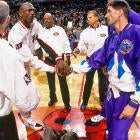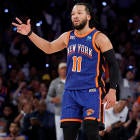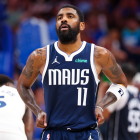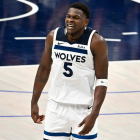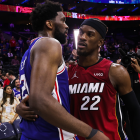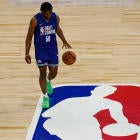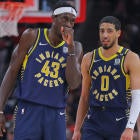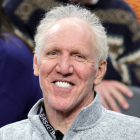The rousing Michael Jordan documentary "The Last Dance", now completed, delivered on its purpose: It has burnished to a fine sheen the notion that Jordan is the greatest basketball player of all time.
Whether or not LeBron James can in the years ahead again blur that belief remains to be seen.
But let's for a moment focus on another interesting reminder of Jordan's greatness and its consequences for those who were in his way. Let's look back at all those unfortunate enough to have crossed Jordan's path and been diminished as a result.
Call it Michael Jordan's trail of the fallen.
Shot after shot. Buzzer-beater after buzzer-beater. Psychological victories, one after the other, the slew of potential dynasties slain and destroyed before they ever came into being. All of this was on display in "The Last Dance".
We'll begin with perhaps the most historically significant casualty of the Jordan Era.
Karl Malone
The Mailman's career should be gilded in enough glory and greatness that his name is synonymous with players like Tim Duncan, Kobe, LeBron, Shaq, Magic, Russell, Bird and, yes, Mike. It's not because Mike's presence squashed that reality, erasing Malone not just from the NBA's championship history but largely from its memory of legacy and ultimate greatness.
Malone rarely makes the cut when weighing the greatest players in NBA history, including on our recent top 15 players of all-time list. I left him off my own list when I voted. I struggled for so long, looking it up and down, turning his career this way and that, trying to fit him somewhere among those other giants of the game.
But Jordan had done the job with me, too, degrading Malone so much by depriving him of a win in either of their Finals showdowns.
Despite Malone's stunning resume.
He was a two-time MVP, one of only 13 players in history to win two or more of them. He's the second all-time leading scorer and eighth all-time in rebounds.
If the Utah Jazz beat the Chicago Bulls twice, Malone is regarded, perhaps, as one of the top five players ever.
Jordan made him an afterthought.
John Stockton
Malone's partner in crime also felt the sting of playing against, and losing, to Jordan.
Stockton's resounding grit, clutch-shot making and absurd court vision got their rightful moments in "The Last Dance". Like with Malone, landing a single ring would have vaulted Stockton into a level of remembrance and legacy worthy of his massive gifts and accomplishments.
Yes, as you surely know, Stockton is the game's all-time assist leader, having racked up 15,806 dimes over his 19-year career. That's a ridiculous number, and 3,715 more than Jason Kidd, the next closest guy on the list.
But Stockton, whose modus operandi was to defer to others by creating for them, was also a historically great shooter. His 51.5 percent shooting percentage from the field over his career -- 51.5 percent! -- is the fourth-highest for any point guard in NBA history, behind only Dave Twardzik, Maurice Cheeks and Magic Johnson.
And he did that over 19 seasons.
If the Jazz had beaten the Bulls twice -- or Jordan had decided in high school to focus on baseball -- perhaps Stockton takes Pippen's place as the most underrated all-time great in NBA history.
Or in the running as the best point guard ever.
Gary Payton once told me Stockton, not Jordan, was his most daunting defensive challenge over the course of his career.
That notion of someone surpassing Jordan in any basketball category, like all things that ran head into Mike's greatness, is hard to believe all these years later.
Gary Payton
Speaking of GP, "The Glove" was one of the greatest defenders of all time, and his Seattle SuperSonics had a chance for their own glittering moment.
But -- there's a theme emerging here -- Jordan happened.
Yes, Payton got his ring years later as an older but effective veteran player for the Miami Heat. But the Hall of Famer's stature could not rise as far as might have been the case.
Reggie Miller
In "The Last Dance," Miller is thoughtful, candid and raw about how he viewed that Indiana Pacers team and himself when they pushed the Bulls to seven games in the 1998 Eastern Conference finals.
The Pacers, he believed, were a better team than the Bulls.
And Miller himself, he told us, had no fear of Jordan, unlike most of the rest of the league.
Perhaps. The Pacers were a force, and Miller was a fearless Jordan-stopper and one of the great all-time clutch shooters -- yet all that was lost in the amazing final minutes of the conference finals, devoured, of course, by Michael Jordan's overpowering will to win.
Larry Bird
"You b---h, f--- you."
Those were Jordan's parting words to Larry Bird after the Bulls beat the Pacers in Game 7 of that series. They were said in jest, between friends, but they surely sum up the rage so many felt at throwing all they had against the Bulls and then, in a blink, finding they'd lost all the same.
Bird's place on this list is the most fascinating for me. Yes, he's an all-time great player.
But had Jordan not beaten his Pacers team in 1998, he might now be on par or past Jerry West as the greatest basketball force of all time when you combine playing careers with post-playing careers.
Yes, West is the architect behind the Los Angeles Lakers' last five rings (he gets credit for Kobe all the way through), the man who fixed Memphis and a force in helping shape the Golden State Warriors rise.
Yet if Bird had added a ring as a coach, coupled with the Executive of the Year award he'd add more than a decade later, his place as a standard-bearer for NBA greatness would have transcended just his playing days.
No Jordan, and we're talking about LeBron as the game's best ever player, and Bird as its most successful all-around presence.
Patrick Ewing
Out of deference to New York Knicks fans and what has been a generation-long malaise, we're going to keep this short: Ewing, and his team, had shots at championships and all the residual benefits that follow.
Instead, they're a marker to one of the last times the Knicks got close.
Isiah Thomas
Isiah hit a double-whammy here: He ran into Jordan on the court in 1991, when the Bulls ended the Detroit Pistons' run and their shot at a three-peat. He also ran into the politics Jordan unleashed on him as a long (and still) hated rival.
So no three-peat. No Dream Team. No warm embrace from an NBA community. And too often no remembering Isiah with the level of all-time greatness he earned.
Thomas told me recently he's surprised by Jordan's harsh words in "The Last Dance."
What's not a surprise is that, in retrospect, being in Jordan's way ended up costing Thomas and those on this list in ways that were then hard to fathom.
Phil Jackson and Scottie Pippen
These two were anything but Jordan foes, and they clearly were not diminished by their time with him. But the same interesting question applies: If Jordan had not crossed their paths, where might they have ended up?
For Phil, it's hard to believe he would have made the successful jump from coaching basketball in Puerto Rico and Canada to leading 11 NBA teams to championships. Perhaps in that alternate universe, Jerry Krause brings him to Chicago anyway, and Phil unlocks in Pippen an alpha-leader who barrels the Bulls to greatness without Mike.
Perhaps …
And then there's Pippen himself.
His road without Jordan would be fascinating to know. All-time great? Champion? Wasted talent? Hall of Fame player who was great but never got close? Just a guy?
Impossible to know.
Here's what's not: Those that found themselves arrayed with Jordan found greatness, glory, and their place in a part of NBA history that will last.
Those that were on the other side, in the end, were most often less than they otherwise would have been.













